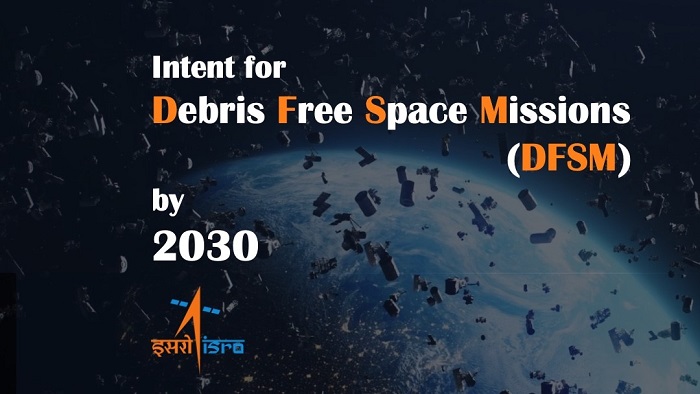India’s Intent on Debris-Free Space Missions – Explained
India intends Debris-Free Space Missions (DFSM). This initiative was declared by Shri Somanath S., Chairman, ISRO/Secretary, DOS during the inaugural opening plenary of the 42nd Annual Meet of Inter-Agency Space Debris Co-ordination Committee (IADC) held at Bengaluru on April 16, 2024. The details of this initiative are provided in this note.
“This initiative aims to achieve debris-free space missions by all Indian space actors, governmental and non-governmental by 2030. India also encourages all other state space actors to follow this initiative for the long-term sustainability of Outer Space”
The initiative will be brought to the notice of the international community and other State space actors to encourage them to join this initiative. Department of Space to ensure space missions with Zero Debris (Debris Free Space Missions – DFSM) by all Indian Space actors, governmental and non-governmental by 2030 through meticulous design and execution of important guidelines.
These include taking the necessary steps to
- Avoid debris generation during the operational life of satellites and launch vehicles as well as during the post-mission disposal phase
- Avoid on-orbit collision and break-up of satellites and launch vehicles through necessary failure mode studies, redundant systems and mission design with high reliability,
- Avoid intentional break-ups with long-lived debris
- Comply with the Post-mission disposal (PMD) of spent orbital stages and satellites with a success probability of more than 99%. Ensure either controlled re-entry or de-orbiting to a lower orbit with less than 5 years remaining orbital life for rocket bodies and spacecraft at their end of operational life.
This intent also ensures that by 2030 all satellite and launch vehicle missions will be planned and operated taking into account
- Special considerations for human spaceflight safety – Considering 400 km +/- 30 km band as the orbital band for human space missions by avoiding minimum orbital transfers in this band by space missions
- Ensuring trackability, identifiability, and maneuverability of all satellites throughout the mission phases
- Recommending all Spacecraft mission extensions only after critical consideration of system health, safety and system readiness for post-mission disposal
- Coordination and data sharing, at National and International levels, for safe and sustainable operations
This intent will ensure the necessary Capacity Building for space object tracking and monitoring and also progress in concerted efforts for Space Debris Research on innovative techniques for the long-term sustainability of outer space activities.
The implementation of this Debris-Free Space Missions initiative will start by the beginning of 2025 by making efforts at the mission planning and design level for launch vehicle and spacecraft missions by selecting orbital slots considering the collision threats in the orbital bands, fuel budgeting for post-mission disposals, mission trajectory planning with necessary controlled re-entry or de-orbiting and also considering the reliability aspects. Annual progress will be evaluated on the implementation of the DFSM, the ISRO system for safe and sustainable space operations management (IS4OM) will be the nodal point in implementing the DFSM with the support of other entities of the Department of Space.
This Debris-Free Space Missions initiative supports global efforts for long-term sustainability and places India as one of the space agencies that puts paramount importance on the safety, security and sustainability of outer space activities.
The long-term goal matches with the theme “Join Together for a Safe, Secured and Sustainable Space, Preserve the Common Heritage of Humankind for Future Generations, Space for all & for all generations”
About ISRO
Indian Space Research Organisation (ISRO) is the space agency of India. The organisation is involved in science, engineering and technology to harvest the benefits of outer space for India and the mankind. ISRO is a major constituent of the Department of Space (DOS), Government of India. The department executes the Indian Space Programme primarily through various Centres or units within ISRO.
ISRO was previously the Indian National Committee for Space Research (INCOSPAR), set up by the Government of India in 1962, as envisioned by Dr. VikramA Sarabhai. ISRO was formed on August 15, 1969 and superseded INCOSPAR with an expanded role to harness space technology. DOS was set up and ISRO was brought under DOS in 1972.
The prime objective of ISRO/DOS is the development and application of space technology for various national needs. To fulfil this objective, ISRO has established major space systemsfor communication, television broadcasting and meteorological services; resources monitoring and management; space-based navigation services. ISRO has developed satellite launch vehicles, PSLV and GSLV, to place the satellites in the required orbits.
Alongside its technological advancement, ISRO contributes to science and science education in the country. Various dedicated research centres and autonomous institutions for remote sensing, astronomy and astrophysics, atmospheric sciences and space sciences in general function under the aegis of Department of Space. ISRO’s own Lunar and interplanetary missions along with other scientific projects encourage and promote science education, apart from providing valuable data to the scientific community which in turn enriches science.
ISRO has its headquarters in Bengaluru. Its activities are spread across various centres and units. Launch Vehicles are built at VikramSarabhai Space Centre (VSSC), Thiruvananthapuram; Satellites are designed and developed at U R Rao Satellite Centre (URSC), Bengalure; Integration and launching of satellites and launch vehicles are carried out from Satish Dhawan Space Centre (SDSC), Sriharikota; Development of liquid stages including cryogenic stage is carried out at Liquid Propulsion Systems Centre (LPSC), Valiamala& Bengaluru; Sensors for Communication and Remote Sensing satellites and application aspects of the space technology are taken up at Space Applications Centre (SAC), Ahmedabad and Remote Sensing satellite data reception processing and dissemination is entrusted to National Remote Sensing Centre (NRSC), Hyderabad.
The activities of ISRO are guided by its Chairman, who would also be the secretary of DOS and Chairman of Space commission – the apex body that formulates the policies and overseas the implementation of the Indian Space Programme.
Source: ISRO


